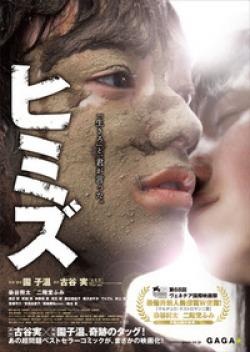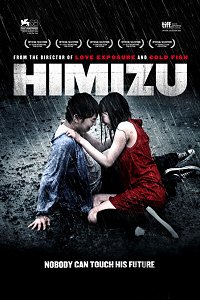Himizu


Directed by Shion Sono [園 子温], 2011, 129 minutes
Review by Susan Meehan
Film director Shion Sono was working on his adaptation of Himizu, a manga by Minoru Furuya [古谷 実 ,], when Japan was devastated by the 11 March earthquake and tsunami. Sono incorporated changes into his film accordingly.
Set against the backdrop of post earthquake and tsunami Japan the pain Himizu portrays is unrelenting and in contrast to often saccharine portrayals of Japan. It is hard-hitting and unflattering, exposing a cruel and violent side of society that emerges with the implosion of order.
Given that the Great North East Japan Earthquake left 19,000 dead perhaps Sono wanted to show how precarious and vulnerable we are as human beings, whether at the mercy of natural forces or other people.
Keiko Chazawa, played by Fumi Nikaido [二階堂 ふみ], befriends Sumida, played by Shota Sometani [染谷 将太], at school; she is absolutely smitten and wants the best for him. They are both fourteen years old and emotionally fragile.
Sumida wants to be ‘normal’, yet normal for him means living like a ‘himizu’ or mole – quietly and fending for himself. He lives in a shack and takes over his family’s rental boat business. His mother leaves with another man and his father is alcoholic, abusive and mainly absent. While Sumida’s mother wants her husband dead and fantasizes about killing him (when another earthquake strikes and no one will notice), Sumida’s father wants his son dead.
It is all very grim.
Keiko is hyperbolic and annoyingly, screechingly enthusiastic; she is Sumida’s one-person cheerleading band. Keiko doesn’t want Sumida to retreat from life but wants him to make a success of his boat rental business. In order to get him on his way, Keiko starts drumming up customers and producing fliers advertising the boats.
She receives no thanks; on the contrary, Sumida often slaps her when she is too exuberant for his liking. Depressingly, he repeats the behaviour of his odious parents.
Keiko’s parents are no nicer, but being wealthy, comfortably live in a large house in a nice part of town. They have lovingly arranged a noose for Keiko to hang herself, so it is no surprise that she would rather spend time away from home with Sumida despite his tendency to slap her.
The bleak, existential film is too uncomfortable to watch at times. While the violence portrayed made me feel queasy, the images of the destruction visited by the earthquake and tsunami which are interwoven into the film are, of course, far more harrowing, poignant and tragic for the whole of Japan.
Himizu left me cold with nothing to show for the two hours spent watching it and, occasionally, averting my eyes from the violence. While a bleak and violent series and film such as This is England is also a thoughtful comment on society, Himizu, unfortunately, does not match this depth, being somewhat erratic.
If Japanese society is to recover from its trauma, ‘normality’ shouldn’t be the aspiration of the young. In any case, being normal doesn’t mean shying away from society but trying to fit in with the demands and constraints of family life and society while trying to make life better for all.
The two young stars played their roles exceedingly well and it is worth mentioning that Shota Sometani and Fumi Nikaido deservedly received the Marcello Mastroianni Award for Best New Young Actor and Actress at the 68th Venice International Film Festival in September 2011.

